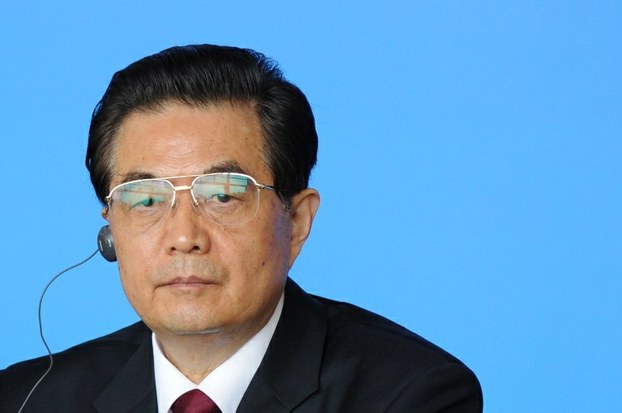Spanish court to pursue Tibet 'genocide' case against Hu Jintao
| Publisher | Radio Free Asia |
| Publication Date | 11 October 2013 |
| Cite as | Radio Free Asia, Spanish court to pursue Tibet 'genocide' case against Hu Jintao, 11 October 2013, available at: https://www.refworld.org/docid/5261034812.html [accessed 14 October 2022] |
| Disclaimer | This is not a UNHCR publication. UNHCR is not responsible for, nor does it necessarily endorse, its content. Any views expressed are solely those of the author or publisher and do not necessarily reflect those of UNHCR, the United Nations or its Member States. |
2013-10-11
 Hu Jintao attends a summit in Sanya, Hainan province on April 14, 2011. AFP
Hu Jintao attends a summit in Sanya, Hainan province on April 14, 2011. AFP
A Spanish court has agreed to hear charges of genocide in Tibet against former Chinese president Hu Jintao, drawing praise from rights groups and Tibet supporters and a rebuke from Beijing, which called the move an "attack" on the Chinese government.
The ruling by the Spanish National Court on Wednesday came in response to an appeal against an earlier decision to shelve the lawsuit against Hu.
In reversing its earlier ruling, the court said that one of the plaintiffs in the case, Thubten Wangchen, an ethnic Tibetan, is also a Spanish citizen and said that Chinese authorities had not carried out its own investigation into the allegations.
The Spanish legal system recognizes the universal justice principle, under which genocide or war-crimes suspects can be put on trial outside their home country, but Spanish law requires that any case brought forward must directly involve Spain or a citizen or resident of Spain.
The judges' decision was supported by "international evidence of the repression carried out by Chinese leaders against the Tibetan nation and its population," according to court documents quoted by the Spanish advocacy group Comite de Apoyo al Tibet (CAT), which helped bring the suit.
"At one point, we thought this case would not be able to move ahead because of Chinese pressure," Wangchen told RFA's Tibetan Service in an interview on Friday.
"But day before yesterday , the court's six judges announced their decision after looking into all the details," said Wangchen, who is the director of the Barcelona-based Fundacion Casa del Tibet.
"The judges made it clear that [Chinese] authorities have deliberately planned to erase the Tibetan race and culture."
Though it is unlikely that Hu Jintao will ever set foot in a Spanish court, "the court will set a date for the former Chinese leader to appear for a hearing, and we will see what happens," Wangchen said.
"Even if Chinese leaders never appear in court, this is still a victory because the story will be reported in the world media," he said.
'Coordinated actions'
In announcing its ruling, the Spanish court pointed to a "series of coordinated actions" by Chinese leaders "aimed at eliminating the specific characteristics and existence of the country of Tibet by imposing martial law, carrying out forced transfers and mass sterilization campaigns, [and] torturing dissidents."
China has also opened Tibet to mass immigration by Han Chinese "in order to gradually dominate and eliminate the indigenous population in the country of Tibet," the court said.
Hu Jintao, China's president from 2003 to 2013 and ruling Chinese Communist Party chief in China's Tibet Autonomous Region from 1988-1992, is one of several former Chinese leaders – including former president Jiang Zemin and premier Li Peng – named in the suit.
The Washington-based International Campaign for Tibet (ICT) described the court's decision as "significant."
"This verdict sends a strong signal to the Chinese leadership and is a significant development in seeking accountability at the highest levels in China for the Communist Party leadership's failed policies in Tibet," said Bhuchung Tsering, ICT's interim president.
"It is an important step on the road to pursuing universal justice as the method of obtaining criminal responsibility of the leadership of the Chinese Communist Party," he said.
'Firmly opposed'
But China on Friday slammed the Spanish court's ruling, calling the move an attempt to "attack the Chinese government and sabotage friendly relations between China and [Spain]."
"Tibet is an inseparable part of China," a Chinese Foreign Ministry spokeswoman said, adding, "We are firmly opposed to any country or any individuals' interference in China's domestic affairs under the pretext of the Tibet-related issue."
ICT said the court decision, coming just before China undergoes a review of its rights record at the U.N. Human Rights Council in Geneva on October 22, could lead to moves to seek Hu's arrest if he were to travel out of China for questioning on the crimes he is accused of, or the possibility of bank accounts overseas being preventively frozen.
The judges recognized that the move against Hu Jintao comes at the judicial moment "when his diplomatic immunity expires," it said.
China consistently rejects all outside criticisms of its policies in Tibet as interference in its internal affairs, claiming the complaints are orchestrated by a group, or "clique," led by exiled Tibetan spiritual leader the Dalai Lama.
The Spanish court's investigation of Hu and other Chinese leaders for their actions in Tibet was initially shelved in February 2010 because of a change in Spanish law restricting "universal jurisdiction" inquiries to cases involving Spain or citizens or residents of Spain.
Reported by Dorjee Damdul for RFA's Tibetan Service. Translated by Karma Dorjee. Written in English with additional reporting by Richard Finney.
Link to original story on RFA website
